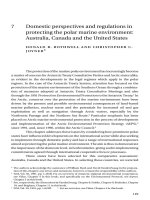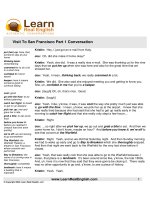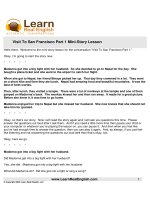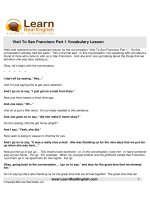52802 visit canada regulations
Bạn đang xem bản rút gọn của tài liệu. Xem và tải ngay bản đầy đủ của tài liệu tại đây (145.88 KB, 2 trang )
Visiting Canada Regulations
Every year, more than 35 million people travel to Canada to enjoy the many
opportunities the country has to offer, besides 1 visiting family and friends.
If you want to visit Canada, you must first find 2 out if you need a visitor (or a temporary resident) visa.
Many people do not have to apply for 3 a visa4 to visit Canada. These include most European citizens, for example
Italians, and United States citizens and permanent residents. However, they must carry proper identification for
themselves and all children travelling with them. They mustn’t stay longer than six months. Moreover, if they want to
travel to Canada for reasons different from business or pleasure, for example for study or temporary work, they must
apply for a visa anyway5.
Some nationals (China, Indonesia, Thailand, Taiwan or Philippines) don’t have to apply for a visa if they are on transit 6
to the USA, but they must have a valid USA visa.
If your state is not included in the list of exempted nationals or you are a stateless individual you mustn’t try to enter
Canada without a visa, even if you are in transit to another country. You have to decide which visa is suitable for your
trip: are you going to Canada as a tourist, a visiting relative or a business visitor? In fact, visa application procedures
vary according to the type of visa.
All visitors must have a valid individual travel document, such as 7 a passport; be in good health; convince an
immigration officer that in their country of origin they have ties 8, such as a job, home, financial assets 9 and a family,
that will take them back; convince an immigration officer that you will leave Canada at the end of your visit and have
enough money for your stay.
After your arrival in Canada, you mustn’t apply later than 30 days before your status10 expires if you wish to change
your Canada visitor status: extend your visit or stay; change the type of permit you hold (for example, from a student
to a work permit); change a condition of your permit (for example, if you are studying and you want to change schools,
or if you are working and you want to change your job).
COMPREHENSION EXERCISE 1
Match the words from the text to their synonym or definition.
1.
2.
3.
4.
5.
6.
7.
8.
9.
10.
A.
B.
C.
D.
E.
F.
G.
H.
I.
L.
Official authorization to enter a foreign country
Link
Possession
In addition to
Short stop to change transportation
Official position or condition of a person in a country
Discover
Make an official request
For example
In any case
COMPREHENSION EXERCISE 2
1
Decide if the following statements are true or false. 2Correct the false ones.
1.
2.
3.
4.
5.
6.
BESIDES
FIND OUT
APPLY FOR
VISA/PERMIT
ANYWAY
TRANSIT
SUCH AS
TIE
ASSET
STATUS
ALL foreigners must have a visa to enter Canada.
ALL foreigners must carry a passport.
The maximum permitted stay for non-visa tourists is three months.
Some nationals need a visa just to transit in Canada.
There is only one type of visa.
You don’t have to be healthy to visit Canada.
____
____
____
____
____
____
COMPREHENSION EXERCISE 3 - QUESTIONNAIRE
Answer the questions with complete sentences.
1)
2)
3)
4)
5)
6)
7)
8)
9)
10)
How many people visit Canada every year?
How long can Italians stay in Canada without a visa?
Which nationals don’t have to get a visa if they are in Canada on transit to the USA?
Why do you have to decide which type of visa you need before application?
What are the basic requirements for entry to Canada?
Who checks aspiring visitors upon entry to Canada?
Which changes can be made to a Canada visitor status?
When do you have to apply to change a Canada visitor status?
Which English-speaking country would you like to visit? Why?
In your opinion, what are the advantages and disadvantages of studying in another country?
Explain.
/> />
COMPREHENSION EXERCISE 1
Match the words from the text to their synonym or definition.
1D/2G/3H/4A/5L/6E/7I/8B/9C/10F
COMPREHENSION EXERCISE 2
1
Decide if the following statements are true or false. 2Correct the false ones.
1.
ALL foreigners must have a visa to enter Canada.
F
2.
3.
ALL foreigners must carry a passport.
The maximum permitted stay for non-visa tourists is three months.
The maximum permitted stay for non-visa tourists is SIX months.
Some nationals need a visa just to transit in Canada.
There is only one type of visa.
There isn’t only one type of visa.
You don’t have to be healthy to visit Canada.
You MUST be healthy to visit Canada.
T
F
4.
5.
6.
Many people do not have to apply for a visa to visit Canada.
T
F
F
COMPREHENSION EXERCISE 3 - QUESTIONNAIRE
Answer the questions with complete sentences.
1)
How many people visit Canada every year?
2)
How long can Italians stay in Canada without a visa?
Italians/We can’t stay in Canada without a visa longer than six months.
Which nationals don’t have to get a visa if they are in Canada on transit to the USA?
3)
4)
More than 35 million people travel to Canada every year.
The nationals of China, Indonesia, Thailand, Taiwan and Philippines don’t have to apply for a visa
if they are on transit to the USA.
Why do you have to decide which type of visa you need before application?
You have to decide which type of visa you need before application because visa
application procedures vary according to the type of visa.
5)
What are the basic requirements for entry to Canada?
6)
Who checks aspiring visitors upon entry to Canada?
Immigration officers check aspiring visitors upon entry to Canada.
Which changes can be made to a Canada visitor status?
7)
8)
9)
10)
All visitors must have a valid individual travel document, such as a passport; be in good health;
convince an immigration officer that in their country of origin they have ties, such as a job,
home, financial assets and a family, that will take them back; convince an immigration officer
that you will leave Canada at the end of your visit and have enough money for your stay.
You can extend your visit or stay; change the type of permit you hold (for example, from a
student to a work permit); change a condition of your permit (for example, if you are studying
and you want to change schools, or if you are working and you want to change your job).
When do you have to apply to change a Canada visitor status?
You mustn’t apply later than 30 days before your status expires.
Which English-speaking country would you like to visit? Why?
1
I wouldn’t like to visit any English-speaking country, because I don’t like the English
language and cultures. I prefer Latin cultures and the Spanish language.
2
I would like to visit the USA, Canada, Australia, New Zealand, India, Canada because I
like its different landscapes (the canyons, the Pacific Coast, the Niagara Falls/the Great
Barrier Reef, the Outback/Rajastan, Goa, … ), its modern cities and skylines, its exotic
wildlife, for example grizzly bears/kangaroos and koalas/cobras/lynxes.
I have already been there once/twice. In 20.. I visited … I liked it/didn’t like it because
….
In your opinion, what are the advantages and disadvantages of studying in another country?
Explain.
In my opinion, studying in another country is both fantastic and terrible. It is fantastic
because you get to know new people, places, food and cultures; on the other hand, it is
terrible because you are away from home and you feel alone, even because you must
speak, read and understand another language. Moreover, you have to take care of
yourself and to be more responsible. I would like to live this experience, but at the
same time, I would be very worried before departure!









